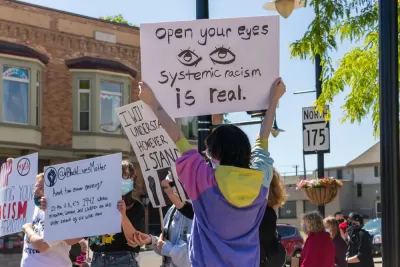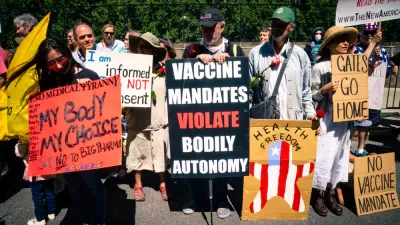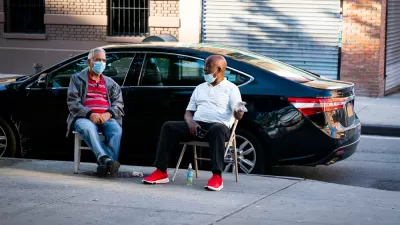New research from the Brookings Institution illuminates the racial disparities of public health outcomes both during and before the pandemic.

An article for the Brookings Institution, written by Andre M. Perry, Carl Romer, and Anthony Barr, digs into the poor life expectancy of Black Americans—public health outcomes connected to environmental injustices in predominantly Black communities.
The first paragraph of the article succinctly summarizes the disparities in the health impacts of the Covid-19 pandemic:
Earlier this year, the National Center for Health Statistics (NCHS) published data showing a 1.5-year decline in national life expectancy in 2020, largely due to the COVID-19 pandemic, which took the lives of approximately 375,000 Americans that year. The NCHS reported that white Americans’ life expectancy declined by 1.2 years; for Black Americans, that number was 2.9 years.
The article focuses on social determinants of health at the local level.
Because de jure and de facto segregation concentrated Black Americans in specific locales, racial injustices have occurred through place-based discrimination: disproportionate exposure to pollution and hazardous waste, harmful zoning practices, and post-disaster displacement, to name a few.
The article proceeds to present two findings from the authors' analysis that highlight "hyperlocal variation in life expectancy" prior to the pandemic. The first finding: "neighborhood life expectancy correlates with neighborhood demographics." The second: "neighborhood life expectancy disparities exist relative to the surrounding metro area."
The source article, linked below, provides more details on those findings, including the methodology for each. The conclusion the authors suggest, after presenting these findings, is critical for planners: "Both findings illuminate the fact that racial gaps in life expectancy manifest as place-based problems."
FULL STORY: Why is life expectancy so low in Black neighborhoods?

Study: Maui’s Plan to Convert Vacation Rentals to Long-Term Housing Could Cause Nearly $1 Billion Economic Loss
The plan would reduce visitor accommodation by 25,% resulting in 1,900 jobs lost.

Alabama: Trump Terminates Settlements for Black Communities Harmed By Raw Sewage
Trump deemed the landmark civil rights agreement “illegal DEI and environmental justice policy.”

North Texas Transit Leaders Tout Benefits of TOD for Growing Region
At a summit focused on transit-oriented development, policymakers discussed how North Texas’ expanded light rail system can serve as a tool for economic growth.

Nevada Bills Aim to Establish Home Insurance Assurance Amidst Wildfire Risk
Republican sponsor hopes the FAIR plan would be “a true market of last resort.”

Virginia Law Allows Judges to Mandate Speed Limiters
The law could set a new precedent for speed limiting tech on U.S. vehicles.

Comment: EPA Cuts will Send Atlanta Back to Eye-burning Ozone, Lung-damaging Smog, and Raw Sewage in the Chattahoochee River
A veteran political journalist takes stock of the hard-earned ground Georgia stands to lose with slashed environmental protection.
Urban Design for Planners 1: Software Tools
This six-course series explores essential urban design concepts using open source software and equips planners with the tools they need to participate fully in the urban design process.
Planning for Universal Design
Learn the tools for implementing Universal Design in planning regulations.
City of Santa Clarita
Ascent Environmental
Institute for Housing and Urban Development Studies (IHS)
City of Grandview
Harvard GSD Executive Education
Toledo-Lucas County Plan Commissions
Salt Lake City
NYU Wagner Graduate School of Public Service





























